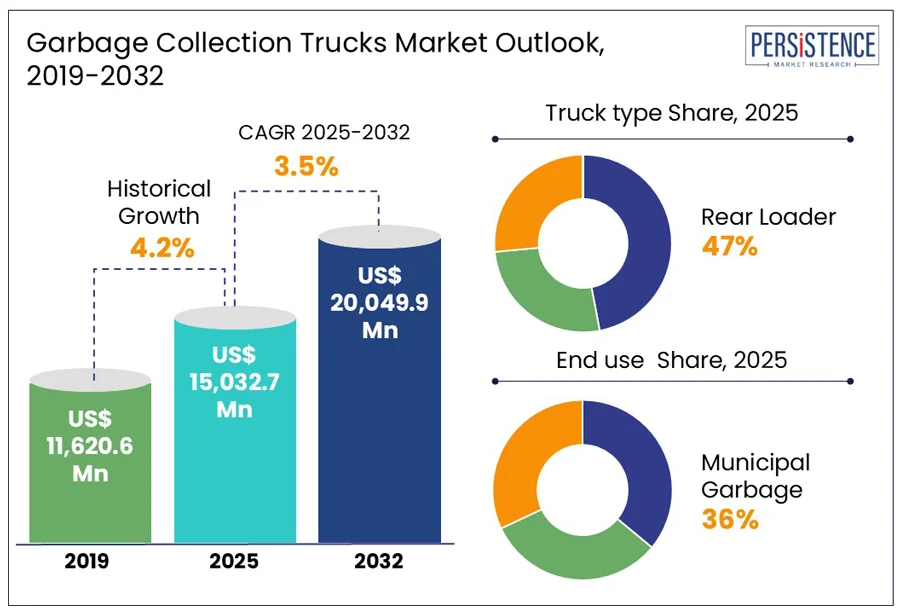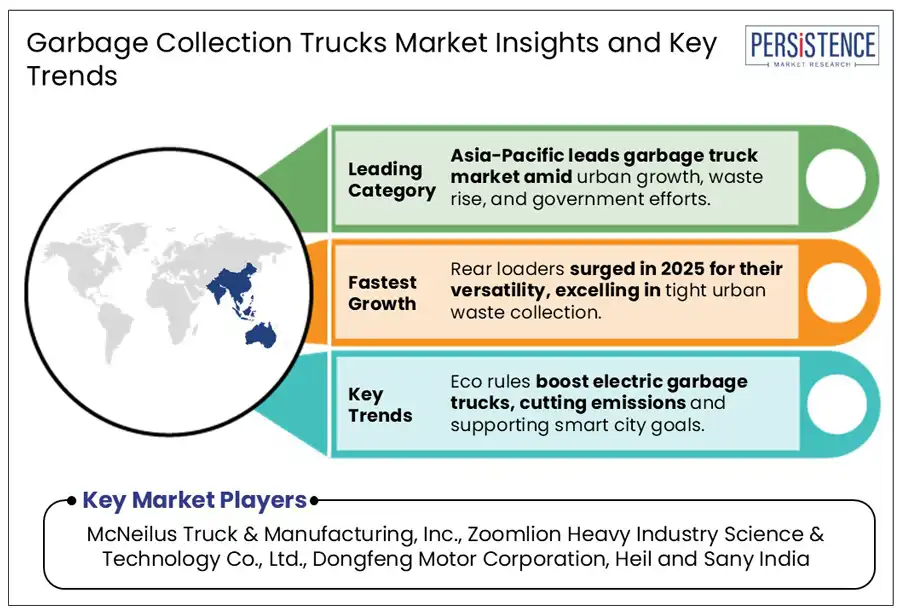ID: PMRREP22030| 189 Pages | 6 Jun 2025 | Format: PDF, Excel, PPT* | Automotive & Transportation

The global garbage collection trucks market size is anticipated to rise from US$ 15,032.7 Mn in 2025 to US$ 20,049.9 Mn by 2032. It is projected to witness a CAGR of 4.2% from 2025 to 2032. The garbage collection vehicle is used to collect and clean garbage from residential societies, densely populated localities, and roadside dumpings. These vehicles are particularly manufactured to collect municipal waste and deposit the waste at the waste or recycling treatment/management plant. These vehicles have sections to collect waste, and the section are located either in front or at the back of the vehicle. Different loading mechanisms are used to load waste onto the vehicles by such as front loading and top loading. According to the need of the service, the size of the vehicles collecting waste varies.
In accordance with increasing population and rising municipal solid waste generation, governments are spending substantial amounts to ensure efficient working of wastewater treatment and solid waste management plants. Garbage collection trucks are essential for the proper functioning of the waste management process. This factor is expected to fuel the growth of the garbage collection trucks market in the upcoming years.

Key Highlights of the Garbage Collection Trucks Market
|
Global Market Attribute |
Key Insights |
|
Garbage Collection Trucks Market Size (2025E) |
US$ 15,032.7 Mn |
|
Market Value Forecast (2032F) |
US$ 20,049.9 Mn |
|
Projected Growth (CAGR 2025 to 2032) |
4.2% |
|
Historical Market Growth (CAGR 2019 to 2024) |
3.5% |
Growing concerns regarding effective procedures for waste management, innovations in garbage collection trucks are also rising the demand for waste disposal and recycling. Thus, key players are focused on the adoption of various technologies in order to expand the productivity and efficiency of their products. Manufacturers are also concentrating on introducing several technological advances in garbage collection trucks, such as increasing the degree of automation, rising efficiency through reduction of downtime and noise. Further, manufacturers are working on to introduce new features such as real-time monitoring and several new equipment additions for collection of waste from segregation and streets.
Cement, sand, or bricks required for the construction of houses has resulted to grow in mining activity as well. Garbage trucks carry sand, demolition waste, gravel, etc., from a construction or mining site to waste management sites. Growth of the construction and mining industries is mainly to fuel the global garbage truck market in the coming years. As per World Health Organization, about 12.6 million deaths results due to environment problems. A growing population and rising municipal solid waste generation are the factors boosting growth for the unhealthy environment.
The acquisition of advanced garbage collection trucks, especially those equipped with modern technologies like electric or hybrid propulsion systems, automated collection mechanisms, and eco-friendly materials, requires substantial capital investment. These vehicles often come with sophisticated features such as GPS, RFID, and smart sensors, which, while enhancing efficiency, significantly increase the purchase price. For instance, electric and hybrid garbage trucks are more expensive than conventional diesel-powered trucks, with costs further amplified by the need for specialized charging infrastructure.
The maintenance and operational expenses associated with these advanced vehicles, including fuel, repairs, and parts replacement, can be substantial. Smaller municipalities and waste management companies with limited financial resources may find it challenging to invest in and maintain a fleet of modern garbage collection trucks. These cost-related challenges can limit the adoption of advanced garbage trucks, particularly in developing regions where budget constraints are more prevalent.
The shift towards electric and alternative fuel-powered garbage trucks presents a substantial growth opportunity. Municipalities and waste management companies are increasingly investing in eco-friendly vehicles to meet environmental regulations and reduce operational costs.
Companies such as McNeilus have developed electric garbage trucks equipped with advanced features, catering to the demand for sustainable waste collection solutions. Similarly, Dennis Eagle introduced the eCollect, an all-electric refuse collection vehicle, which has been adopted by multiple local authorities in the UK.
In India, the Ranchi Municipal Corporation retrofitted 24 defunct vehicles into electric garbage trucks, aiming to deploy a total of 150 EVs. Additionally, Superior Pak in Australia showcased the country's first hydrogen-powered garbage truck, developed in partnership with Hyzon Motors.
This is expected to create significant growth opportunities for the garbage collection trucks market.
The rear loader segment was valued at over USD 5 billion in 2025. The rear loader segment experienced a considerable upturn in 2025, fueled by its practicality and versatility. Rear loader trucks excel in urban and suburban settings, effortlessly navigating narrow streets and tight spaces while efficiently collecting waste. Their user-friendly design and efficient loading mechanisms make them the preferred choice for waste management companies worldwide. With a focus on optimizing collection routes and maximizing productivity, rear loader trucks maintain their dominance in the market.
For instance, McNeilus Truck and Manufacturing offers innovative rear loader models such as the McNeilus Heavy-Duty Rear Loader, featuring enhanced compaction ratios and smart controls for increased efficiency. Similarly, Heil Environmental has introduced advanced rear loaders with improved hydraulics and automation for better performance and fuel savings.
Municipal waste collection dominates the market due to the rising volume of household and urban waste, especially in densely populated cities. Municipalities across the globe are investing heavily in efficient garbage collection fleets to meet environmental regulations and improve sanitation. According to the World Bank, urban areas generate over 2 billion tons of municipal solid waste annually, a figure expected to increase due to urbanization. Governments are also pushing for the adoption of smart and electric garbage trucks to reduce emissions, further boosting demand in this segment.
The industrial garbage segment also contributes significantly, driven by growing industrial activities and the need to manage hazardous and non-hazardous waste safely. Industrial waste collection trucks are often equipped with specialized features to handle diverse waste types, ensuring compliance with safety and environmental standards.

Asia Pacific is poised to account for a larger share in 2025. China, India, and Japan, are all included in the Asia-Pacific area. Due to the growing emphasis on waste management, the Asia-Pacific region is predicted to develop at the quickest rate. Asian nations like China, India, Japan, and others are seeing rising industrialization together with a quickening rate of population growth. Consumer awareness of the harmful effects open dumping has on the environment, and human health is rising.
Additionally, the exponential rise in generating municipal solid trash in nations like China and India has prompted them to support educational initiatives, implement incentive schemes, create legal frameworks, and enhance garbage management tactics. The need for garbage truck bodies in this region will be fueled by these reasons, which will keep the majority shares in the region.
With innovative technologies and robust manufacturing capabilities, the U.S. has secured a substantial portion of the garbage trucks market. Leveraging advanced engineering and innovative solutions, American manufacturers have carved a niche for themselves globally. With a commitment to environmental sustainability and operational efficiency, U.S. companies have tailored their offerings to meet diverse customer needs across the waste management spectrum. This strategic approach has propelled them to the forefront of the industry, commanding the largest share.
This growth is fueled by increasing urbanization, population growth, and stringent environmental regulations promoting sustainability. The rising generation of municipal solid waste and the shift towards smart city initiatives are driving demand for modern, efficient waste collection vehicles. Technological advancements such as telematics, IoT integration, and automation are enhancing operational efficiency, route optimization, and fuel consumption reduction. Additionally, the adoption of electric and hybrid garbage trucks is gaining momentum due to growing environmental concerns and government incentives. Leading manufacturers like McNeilus Truck and Manufacturing are investing in advanced manufacturing techniques, connected solutions, and electrification to innovate their product offerings.
Europe dominated the global garbage collection vehicle market due to several key factors, including stringent environmental regulations, a strong focus on sustainability, and advanced infrastructure. The region’s commitment to environmental sustainability drives the adoption of eco-friendly technologies, such as electric and hybrid garbage trucks. With many European countries aiming to reduce carbon emissions and meet ambitious climate goals, the demand for zero-emission waste management solutions has surged. The European Union’s rigorous environmental policies, including strict emissions standards for vehicles, have further accelerated the shift towards greener garbage collection fleets.
The region benefits from well-established waste management systems and infrastructure, which support the widespread deployment of advanced garbage collection vehicles. Municipalities in Europe countries have the financial and technological resources to invest in modern waste collection fleets, including vehicles equipped with telematics and IoT solutions for route optimization and operational efficiency. These technologies help reduce fuel consumption, optimize waste collection processes, and enhance the overall sustainability of waste management operations.
The competitive landscape of the global garbage collection trucks market is marked by the presence of several well-established manufacturers and a growing number of emerging players focused on sustainability and automation. Leading companies such as McNeilus Truck and Manufacturing, Heil Environmental, Dennis Eagle, and Labrie Enviroquip Group dominate the market by leveraging decades of experience and extensive distribution networks.
These key players primarily compete on product innovation, vehicle efficiency, and environmental compliance. With increasing demand for eco-friendly and smart waste collection solutions, companies are investing in the development of electric and hybrid garbage trucks, autonomous features, and intelligent route optimization systems. For example, Dennis Eagle has launched the eCollect, an all-electric garbage truck gaining traction across European municipalities.
The market is set to reach US$ 15,032.7 Mn in 2025.
Government regulations and environmental policies and rising industrial and commercial waste are the major growth drivers.
The industry is estimated to rise at a CAGR of 4.2% through 2032.
Electrification and alternative fuels, and SMART waste management integration are the key market opportunities.
McNeilus Truck & Manufacturing, Inc., Zoomlion Heavy Industry Science & Technology Co., Ltd., Dongfeng Motor Corporation, Heil and Sany India are a few leading players.
|
Report Attribute |
Details |
|
Historical Data/Actuals |
2019 - 2024 |
|
Forecast Period |
2025 - 2032 |
|
Market Analysis Units |
Value: US$ Mn, Volume: Units |
|
Geographical Coverage |
|
|
Segmental Coverage |
|
|
Competitive Analysis |
|
|
Report Highlights |
|
|
Customization and Pricing |
Available upon request |
By Truck
By Fuel
By Technology
End Use
By Region
Delivery Timelines
For more information on this report and its delivery timelines please get in touch with our sales team.
About Author